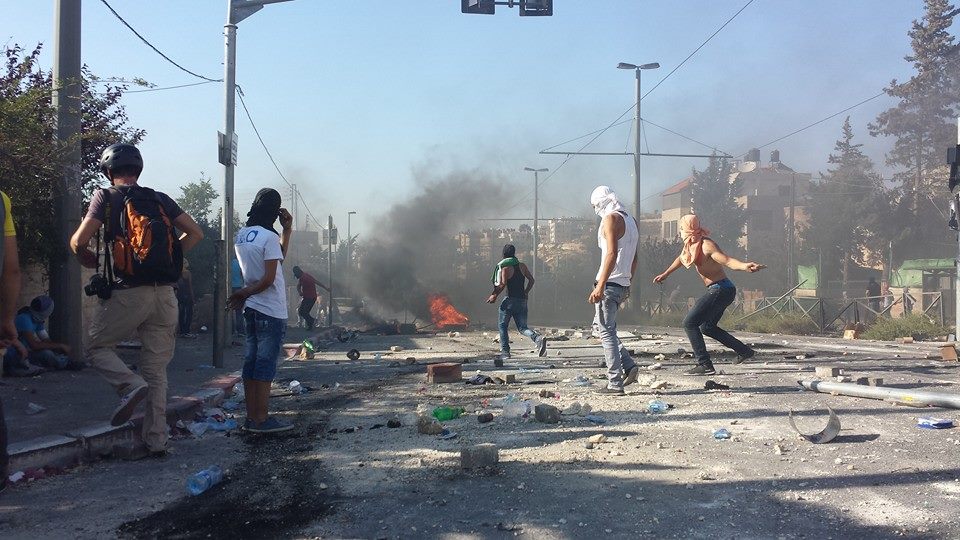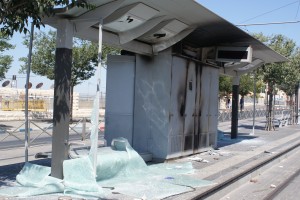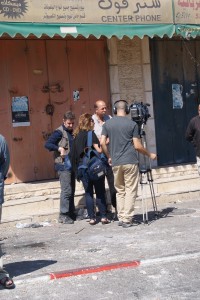Blood is thicker than war
By Khaled Diab
The horrific murders of Israeli and Palestinian teens should drive home how violence is futile and burdens coming generations with future bloodshed.

Photo: ©Ibrahin Husseini
Friday 4 July 2014
Death is in the air, hate is on the airwaves and there is an air of dread, with everyone expecting bad times ahead – the question being just how bad. And at the symbolic, emotive heart of the situation lie four teenagers, three Israelis and one Palestinian, though he is not the first die since this crisis erupted.
Ever since the abduction of three Israeli youth – Gilad Shaar (16), Naftali Fraenkel (16), and Eyal Yifrach (19) – underlying tensions have spilled over. But I will not go into them here. Suffice it to say that a volatile, unsustainable situation received a trigger which is tipping it over the precariously balanced status quo.
The genuine grief felt by Israelis for their compatriots and the solidarity they expressed for the boys' families is understandable. The ripostes by many Palestinians that these were settlers on occupied territory, or, more crucially, that far more Palestinians suffer, including all those prisoners of conscience effectively kidnapped by the state, is missing the point.
Regardless of the right or wrong of the political situation they found themselves in, these were kids and, as a father, I can empathise with their families and sympathise with the grief their disappearance inflicted.
Moreover, it is generally accepted that just resistance does not target civilians – and these teens were clearly civilians. But targeting civilians, as well as collective punishment, is what Israel also does, in spades. In fact, the investigation into the kidnappings saw the mass arrest of Hamas members, not to mention some closures.
At a certain level, Israel's collective grief and sense of joint anguish was admirable and even commendable, if there weren't such an ugly underbelly: the mass hysteria and hatred this unleashed. While it is understandable that this kind of high-profile act should elicit fear, to listen to some Israelis speak, you might be excused for thinking that the kidnappings, tragic as they were, represented an existential threat to the entire nation.
Whereas the reality is that thousands upon thousands of Israelis live in close proximity to Palestinians and in safety. Take Sheikh Jarrah where I live. Even at the highest points of this crisis, I've seen the local hardcore settlers walking around the neighbourhood unprotected and unmolested.
Perhaps the most galling aspect of the whole tragic affair is the unseemly political opportunism of radicals on both sides. The Israeli government used the abductions to provide it with moral cover to crackdown on its arch-enemy Hamas, and even to sabotage the recently born Palestinian national unity government.
For its part, Hamas juggled with the elusive ingredients for having its cake and eating it. While denying any involvement in the kidnapping, it called the abductors “heroes” and criticised the PA for co-operating with Israel in the investigation. At the same time, embattled and broke, Hamas has been discreetly trying to lower tensions so as to avoid a confrontation with Israel, and has cracked down on radical militant groups to keep the peace. In fact, Israel and Hamas are enemies in words but quite often not in deeds.
After a hunt that lasted nearly three weeks, the bodies of the three Israeli teens were located. While the families dealt with their pain and grief, and many Israelis joined them in their mourning, a wave of hate has overtaken numerous segments of Israeli society.
Even otherwise sensible Israelis have succumbed to the atmosphere of rage. “Burning hate and no regard for lives can't be countered with concerts,” one Israeli I know commented, as if Israel's military had turned their guns into rock guitars. “It has to be countered with an iron fist and firm knowledge that murderous actions will have ramifications beyond their wild[est] imagination.”
Extremists angrily called for “revenge” and “death to Arabs” and numerous “price tag” hate crimes have been reported. That's not to mention the deafening cries across the political spectrum, with the exception of Meretz, for military action against Hamas and the destruction of the movement.
I came face to face with this racist sentiment on West Jerusalem's central Zion Square. A number of radical settler youth had set up a memorial for the dead teens but had fashioned the candles into the Hebrew for “Death to Arabs”, a bystander informed me. Being an Arab myself, but apparently not obviously one, it was rather surreal to be witnessing people demanding an end to my life simply because of an accident of birth.
It was also heartening to see bystanders not pass this kind of incitement by passively and a war of words broke out between opponents and supporters of, as the Cure would put it, killing an Arab. One courageous middle-aged women who looked like an ageing hippy stepped into the fray and tried to re-arrange the offensive candle arrangement, only to be met with shouting and chants from the opposing side.
Around the corner from this hate fest was a rally, organised by Tag Meir (Light Tag), an organisation which combats price tagging, which paid tribute to the slain teens and to reject racism and hate crimes. I was pleased that so many from different backgrounds, though the crowd was largely young and middle-class, had come, but what were a few hundred doves to do against the deafening wails of the hawks. In addition, the opposition generally was to vigilantism, and was not targeted against violence perpetrated by the state, no matter how unlawful or counterproductive.
To date, these sentiments and efforts have done little to counteract “price tag” hate crimes, which the Israeli authorities have been reluctant or even unwilling to pursue, especially when targeted at Palestinians in the West Bank.
Hours after the bodies of Yifrach, Fraenkel and Shaar were found, another teen also vanished. But this time it was a Palestinian, 16-year-old Mohammed Abu Khdeir who was snatched on his way to dawn prayers from outside the family home, which is just 20 steps from the mosque.
When Abu Khdeir's charred corpse was discovered in the Jerusalem Forest, Israelis who immediately leapt to blame Palestinians, and specifically Hamas, for the earlier abduction, suddenly changed their tone and started to caution against jumping to conclusions about the perpetrators, while Palestinians who had been taking a wait-and-see attitude pointed an immediate finger at the settlers.
The comforting embrace of conspiracy theories also took hold in numerous Israeli circles, as it had done beforehand with a significant number of Palestinians, with people desperately looking to blame everything, including making assumptions about the boy's sexuality and how his family would react to it, but their own. Echoing earlier Israeli conspiracy theories regarding Muhammad al-Durrah, some Palestinians I have encountered are convinced that the death of the three Israeli teens was staged or was a black-flag op.
Anger at the murder, a recent chain of price tag attacks against Palestinians and the recent Israeli military crackdown, normally sleepy Shuafat erupted into a wave of rage unseen in the quiet suburb for many long years, with the whirring of helicopter blades, the echoing of sirens and the boom of police fire going on late into the night.

The morning after, I cycled down to the tranquil neighbourhood which we had called home for the better part of two years to the aftermath of rage. There was still a heavy police presence. They had cordoned off the main road and were only allowing locals in, but the police just let me slip by with baffled expressions directed to this figure on a bicycle with a child seat on the back.
The tram stop was destroyed, the glass shattered, the ticket machines burnt. Debris was strewn everywhere, most shops were shuttered, and a couple of buildings defiantly flew Palestinian flags which are banned in Jerusalem.
I dropped by to check on four-year-old's spiritual “Tetah”, his surrogate grandmother in Jerusalem who was not only a neighbour but like family. The 92-year-old was very troubled by events and shaken. “I am afraid to open my door to strangers,” she told me. “We used to think that Shuafat was a shelter from all the troubles around us, but it seems nowhere is safe.”
She remenisced over better times: “We used to live next door to Jews in West Jerusalem. We used to socialise with each other, buy things from each other, visit each other's homes. My father's home was near the Jewish cemetry and I never once felt fear. But now I am frightened.”
It shocked me to discover that I know the father of Mohammed Abu Khdeir, but knew him as Abu al-Rae'd, the name of his oldest son. He is the electrical contractor who installed and maintains the electrical installations in our building. Mohammed, a quiet, reserved and hard-working boy has even been in our building and flat, helping his father and older brother out.

Abu al-Raed was standing in a startled daze outside his shop in Shuafat, amid the rubble of his grief and the wreckage of the previous night's fury. The poor man didn't have a moment's rest the day before: hours of interrogation then a riot outside his front door till late into the night. After offering him my condolences, he told me in disbelief how Mohammed was abducted from outside the shop on his way to dawn prayers at the mosque, which is no more than 20 steps away.
I had so many questions I wanted to ask him, but decided to refrain out of respect for his grief and the immense pressure he has been under, including the constant buzzing of the media around him. After hearing what happened from a man in such clear anguish and pain, I find it hard to believe the alternative theories being circulated, though I hope the police will investigate this murder impartially, thoroughly and dedicate to it all the resources it merits so as to get to the truth.
The seating area for the funeral has already been set up and I was invited to join the mourners. Abu al-Rae'd told me that he hoped Mohammed's body would be released today so that they can bury him. RIP Mohammed and may your family too find peace amid their grief.
The street in front of the Abu Khdeir's building was seemingly the focal point of the clashes, with the greatest destruction around it: make-shift barricades, smoking rubbish skips, etc. I found this to be quite insensitive towards the grieving family who have enough on their plate, not to have to deal with violence on their doorstep.
Moreover, the rioting seems to go against the bereaved family's wishes. Not just that, the father, Hussein Abu Khdeir, has called for calm and a stop to senseless violence. Having tasted the pain of such unnecessary loss of someone so young with his life ahead of him, Abu Khdeir does not wish such a fate even upon his people's enemy.
“I am against kidnapping and killing. Whether Jew or Arab, who can accept the kidnapping and killing of his son or daughter?” he said. “I call on both sides to stop the bloodshed.”
Rachel Fraenkel, the mother of one of the murdered Israeli teens, shared Abu Khdeir's parental sentiments. “If a young Arab really was murdered for nationalist reasons, this is a horrifying and shocking act,” she wrote immediately upon learning the news.
In a clear sign that she did not wish to see any self-appointed avengers take it as their mission to avenge her son's death, she Fraenkel: “There is no difference between blood and blood. Murder is murder. There is no justification and no atonement for murder.”
The noble and human sentiments expressed by these sorrow-stricken parents points to a better path ahead: the full rejection of violence – whether carried out by the Israeli army, Palestinian militants, as well as Arab or Jewish terrorists – and its immediate and unconditional condemnation, especially when committed by one's own side.
Objections will immediately be raised on both sides, especially among Israelis who seem to think that state violence is somehow more justified than its non-state counterpart, even though the damage military action inflicts is far greater and it hurts and kills more civilians. But as many Palestinians have (re)discovered, especially after the bloodiness of the Second Intifada, non-violence is far more effective – and subversive.
Nevertheless, the mentality persists on both sides, fuelled by each side's particular history of trauma, weakness and oppression, that acting tough through armed struggle can somehow resolve this conflict. But the evidence is against them.
Although I am a pacifist, I am not naïve. I know there are times and places where violence is unavoidable. However, Israel-Palestine, today, is not one of these times or locations.
Over the past century, the two sides have thrown everything they have at each other, but neither has prevailed. Palestinians and Israelis, each in their own way, are formidable adversaries who will not be broken, and so violence is futile.
In short, force of arms cannot solve what is a political, social, class and religious conflict. The peaceful hand of unarmed resistance and arm-in-arm coexistence is the only way.
____
Follow Khaled Diab on Twitter.
An updated version of this article appeared in The Huffington Post on 8 July 2014.



Pingback: Marching Toward Gaza & a Third Intifada: A First Hand Account » Muftah